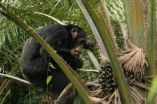(Press-News.org) Some chimpanzees are smarter than others, and about half of that variation in intelligence depends on the genes that individuals carry and pass on from one generation to the next. The findings reported in the Cell Press journal Current Biology on July 10 show that those genetic differences will be key to understanding the cognitive abilities of primates and their evolution over time.
"As is the case in humans, genes matter when it comes to cognitive abilities in chimpanzees," says William Hopkins of the Yerkes National Primate Research Center. "It doesn't mean that they are the only factor determining cognitive abilities, but they cannot be ignored."
The new study found no effect of either sex or rearing history on the cognitive skills of chimpanzees. That is, chimpanzees raised by human caretakers performed no better on cognitive tests delivered to them by humans than did individuals raised by their chimpanzee mothers.
The role of genetics in intelligence has long been debated in scientific circles, the researchers say. It is now clear from previous studies that humans' performances on IQ tests do depend to a large extent on genetics, even if it can be modified by environmental factors. But the role that genes play in animal intelligence had received considerably less attention.
The new study included data on the cognitive abilities of 99 chimpanzees in all, from age 9 to 54. The researchers' analysis found that about 50% of the variation in the chimps' performance on a series of standardized cognitive tests could be attributed to genetic factors.
Studies of chimpanzees could add significantly to scientists' understanding of intelligence, the researchers say. That's in part because, unlike humans, chimpanzee performance on cognitive tests isn't complicated by factors related to school systems or other sociocultural complexities.
The findings suggest that differences in cognition may have arisen in the common ancestor of humans and chimpanzees about 5 million years ago. The findings may also lead to the discovery of particular intelligence-related genes.
"What specific genes underlie the observed individual differences in cognition is not clear, but pursuing this question may lead to candidate genes that changed in human evolution and allowed for the emergence of some human-specific specializations in cognition," Hopkins says. "It is also intriguing to consider what changes in cortical organization might be associated with individual differences in cognition and whether common genes might explain their common variance."
INFORMATION:
Current Biology, Hopkins et al.: "Chimpanzee (Pan troglodytes) Intelligence is Heritable."
Chimpanzee intelligence depends on genes
2014-07-10
ELSE PRESS RELEASES FROM THIS DATE:
Hunger for vegetable oil means trouble for Africa's great apes
2014-07-10
The vegetable oil found in your popcorn or soap might not be ape friendly, and the situation appears likely to get even worse, according to an analysis in the Cell Press journal Current Biology on July 10.
The growing demand for vegetable oil has already led to the conversion of Southeast Asian forest into oil palm plantations, bringing trouble for orangutans in particular. If guidelines are not put in place very soon, researchers say the spread of those large-scale industrial plantations from Asia into Africa will be bad news for great apes there as well.
"The first ...
New compound treats both blindness and diabetes in animal studies
2014-07-10
In a new study led by UC San Francisco (UCSF) scientists, a chemical compound designed to precisely target part of a crucial cellular quality-control network provided significant protection, in rats and mice, against degenerative forms of blindness and diabetes.
In addition to opening a promising drug-development path for the wide range of diseases caused by cell loss, the new research offers a new view of the workings of the unfolded protein response (UPR), a cellular "life-or-death" signaling network: When cells are under stress, the UPR works to ensure that they produce ...
Chimpanzee intelligence determined by genes
2014-07-10
ATLANTA–A chimpanzee's intelligence is largely determined by its genes, while environmental factors may be less important than scientists previously thought, according to a Georgia State University research study.
The study found that some, but not all, cognitive, or mental, abilities, in chimpanzees depend significantly on the genes they inherit. The findings are reported in the latest issue of Current Biology.
"Intelligence runs in families," said Dr. William Hopkins, professor in the Center for Behavioral Neuroscience at Georgia State and research scientist in the ...
Climate change may bring more kidney stones
2014-07-10
As daily temperatures increase, so does the number of patients seeking treatment for kidney stones. In a study that may both reflect and foretell a warming planet's impact on human health, a research team found a link between hot days and kidney stones in 60,000 patients in several U.S. cities with varying climates.
"We found that as daily temperatures rise, there is a rapid increase in the probability of patients presenting over the next 20 days with kidney stones," said study leader Gregory E. Tasian, M.D., M.Sc., M.S.C.E., a pediatric urologist and epidemiologist at ...
In the gut, immunity is a 2-way street
2014-07-10
In recent years, it has become increasingly clear that many diseases are triggered or maintained by changes in bacterial communities in the gut. However, the general view up into now has been rather simple: bacteria stimulate the immune system, leading to inflammation or autoimmune disorders in a single direction.
Now, in work published in Immunity, scientists led by Sidonia Fagarasan from the RIKEN Center for Integrative Medical Science in Japan have painted a more complex picture: the gut immune system does not simply prevent the influx of pathogens, but is actively ...
Sleep disturbances, common in Parkinson's disease, can be early indicator of disease onset
2014-07-10
Amsterdam, NL, 10 July 2014 – Up to 70% of Parkinson's disease (PD) patients experience sleep problems that negatively impact their quality of life. Some patients have disturbed sleep/wake patterns such as difficulty falling asleep or staying asleep, while other patients may be subject to sudden and involuntary daytime sleep "attacks." In the extreme, PD patients may exhibit REM-sleep behavior disorder (RBD), characterized by vivid, violent dreams or dream re-enactment, even before motor symptoms appear. A review in the Journal of Parkinson's Disease discusses the underlying ...
Rice's silicon oxide memories catch manufacturers' eye
2014-07-10
Rice University's breakthrough silicon oxide technology for high-density, next-generation computer memory is one step closer to mass production, thanks to a refinement that will allow manufacturers to fabricate devices at room temperature with conventional production methods.
First discovered five years ago, Rice's silicon oxide memories are a type of two-terminal, "resistive random-access memory" (RRAM) technology. In a new paper available online in the American Chemical Society journal Nano Letters, a Rice team led by chemist James Tour compared its RRAM technology ...
Mayo Clinic calls for standardization of safe imaging protocols for children
2014-07-10
ROCHESTER, Minn. — The benefits of medical imaging far outweigh the risks when children receive The Right Exam, ordered The Right Way, with The Right Radiation Dose. However, overuse and misuse of imaging change the benefit-risk ratio and Mayo Clinic is leading a collaborative effort to ensure a national protocol is put into action. The commentary, published online in the Journal of Patient Safety, calls for the American College of Radiology, the Joint Commission, the Intersociety Accreditation Commission, and the Centers for Medicare & Medicaid Services to require three ...
NOAA's GOES-West satellite sees smoke from Canadian fires over US
2014-07-10
NOAA's Geostationary Operational Environmental Satellite or GOES-West satellite spotted smoke over the U.S. Mid-West from dozens of fires raging in Canada's Northwestern Territories.
At 1200 UTC (8 a.m. EDT) on July 9, 2014, GOES-West captured this image of the brownish-colored haze created by forest fires in Canada's Northwest Territories that drifted all the way into South Dakota. This image was created by the NASA GOES Project at NASA Goddard Space Flight Center, Greenbelt, Md.
According to Canada's Natural Resources, Canadian Wildland Fire Information System, fire ...
NASA sees Tropical Storm Neoguri losing punch along southern Japan's coast
2014-07-10
Once a powerful super typhoon, now an weakening tropical storm, NASA's Terra satellite saw a much weaker Tropical Storm Neoguri moving along the southern coast of Japan.
On July 10 at 0:35 UTC, the Moderate Resolution Imaging Spectroradometer (MODIS) instrument aboard NASA's Terra satellite captured an image of a more disorganized Tropical Storm Neoguri over east central Japan. At the time of the image, a more elongated Tropical Storm Neoguri's center was east of Kyushu, Japan.
A visible image from the Visible Infrared Imaging Radiometer Suite (VIIRS) instrument aboard ...


